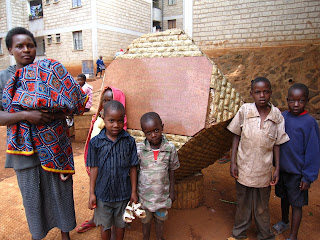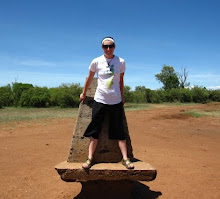Facts about Kibera:
• It is the second largest slum in Africa, and one of the largest informal settlements in the world
• The total population is unknown, but it is estimated to be between 600,000 to 1.2 million people (up to 25% of Nariobi’s total inhabitants)
• The area is approximately one square mile (less than 1% of Nairobi’s total area)
• It is estimated that Kibera houses one-fifth of Kenyans living with HIV
As I walk to the border of Kibera, I can see no movement within the slum. It looks peaceful, inhabited, yet lifeless; a sea of corrugated rusted metal crammed tightly together. Then I hear life. Children playing, people yelling and even talking, all at once, I hear it. It sounds like I have stepped into a buzzing amphitheater. The people here are real and alive.
KENSUP attempts to transform the informal “slums” into government-controlled apartments. Residents of Soweto, a neighborhood in Kibera, have been placed in a holding area, deemed “the decanting site,” for several years while the government upgrades their homes into formal settlements. I have never been sure of how many people live in the decanting site, but I would estimate it is between 1,000 and 2,000 people.
For some, the project offers a new opportunity, but for many, it means eviction. In the decanting site are flats, each flat has three bedrooms, a kitchen, and bathroom. Citizens pay more money than they are used to to rent these apartments; many lose their tax-free rent and income from their businesses. Shop-type home businesses are unable to function in the flats, away from the large customer base of Kibera. However, the site provides reliable water and electricity; it is sanitary and trash-free.
I go to the decanting site everyday to research the living conditions and interview its inhabitants, to ask them about the changes in their lives since moving out of the slum. The first thing I learned about Kiberians is that they are the friendliest people I have ever encountered. Their openness and generosity, despite having so little, have astounded me. I was immediately accepted into their home, although I felt like I was intruding. My good friend, Florence, suggested that I come live with her. Florence is a superb English speaker and has translated the majority of my interviews (as I can speak simple Swahili but have difficulty deciphering it when spoken. It is the same with the residents’ English skills). I have been invited into many homes, been given juice, and have had to decline when they offer me more. Although it may be rude in Kenyan standards, I tell them, “I would rather it be saved for your children.” My other friends, Edwin and Rebecca, have each given me tours of the site and strive to help me with my research. Two days ago, Florence told me she is going to nickname her newborn Kelsey.
Through my visits, I learned that Kiberians were at first skeptical to move into the decanting site. The government of Kenya is at times unreliable, and often steeped with corruption. However, when faced with eviction though demolition, they often have no choice but to comply. Upon arriving at the decanting site, many have told me that their lives became much better. There is constant water and electricity. In the slum, drinking water is fetched with a bucket because the water and sewage pipes are mixed.
In the decanting site, the environment is clean – no “flying toilets” (The toilet-human ratio in the slum is about 1 to 50, so many times human waste is thrown out the window). Kibera’s foundation is built on trash and is very unstable. In the decanting site, however, women are happy to allow their children to play outside without fear of diseases from the sewage. Unfortunately, living in the site is damaging to the income of the displaced residents. Running a business is incredibly difficult, as the decanting site does not have the large customer base of Kibera. The majority of women set up small stands to sell vegetables, fruits, or other goods, but they are not permitted to move their business outside the decanting site, and no customers from the slum may enter the decanting site from outside.
Overall, the women believe the program to be good. But they need loans and capital to jump-start their businesses and to help their fellow women. Although the decanting site offers many advantages over the slum, its residents are earning less income and paying more rent. When I asked what would be most beneficial to their families, the women respond, “money.” They need money to support a family in the decanting site, and, most importantly, to send their children to school. Many have asked me for a sponsorship for the education of their children.
The government claims that the housing is only temporary, and it estimates that they will be able to move back to their homes in three years. But the government does not provide any nearby schools, and three years is a long time to go without education. The first thing I noticed was the children playing in the decanting site during the weekday afternoon. Many children play all day in the decanting site, as school is too far and too expensive.
The women of the decanting site asked for me to help them obtain sponsorships for their children. In Kenya, primary education is “free.” But it is nothing like the U.S. public education. Families must buy books, mandatory uniforms, and provide daily transport for their kids. In even some schools, they must buy their children a desk or the children will sit on the floor.
BBC's "Nairobi Slum Life":
Into Kibera
An Evening in Kibera
Kibera's Children
Escaping Kibera
A donation organization, Children of Kibera
 Monument in the Decanting Site with Florence and her baby on the left and several children residents
Monument in the Decanting Site with Florence and her baby on the left and several children residents
 My friend Edwin tuning his TV. He is quite successful as a Marketing Exec in Nairobi. He lives alone.
My friend Edwin tuning his TV. He is quite successful as a Marketing Exec in Nairobi. He lives alone.
















